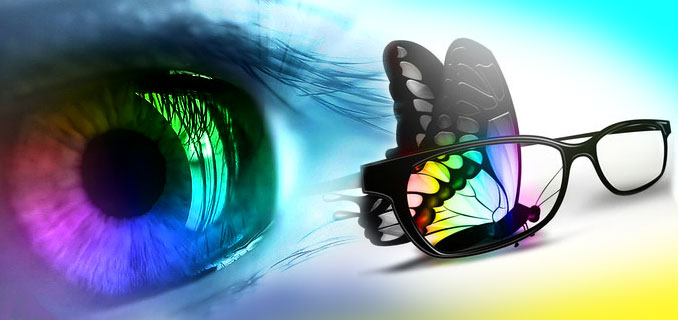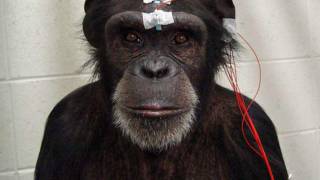Take Off Your Inverted Spectrum Glasses: Color’s True Charm is in the Brain

The human fascination with color never ceases to amaze me. Our perceptual experience is filled with shapes and pitches and textures and timbres and depths and on and on, yet color seems to get the lion share of our excitement and philosophical attention. Color seems somehow more artistic than our other perceptual dimensions; it’s simply wonderful to behold, as evinced by the double rainbow guy; and we can’t resist wondering what it would be like to see dimensions of color beyond our own. In fact, RadioLab recently put out a great show on color that nicely conveys the romance we all have toward it.
Question is: Why do we find color so enthralling? One of the reasons may be that the world can seem arbitrarily labeled in color, as if a painter dabbed over everything in order to make it beautiful… and that naturally makes us wonder what a different artist might do. What sort of splendor is a bird—who has an extra dimension of color beyond ours—treated to, for example?
While I, too, feel the wonder of color, I don’t share this above intuition about color and its arbitrariness. It’s an unfortunate intuition, one that seeps its way not only into the minds of laymen, but into our “enhancement” products and even the hallowed halls of philosophy. In trying to explain what’s wrong with the intuition, let me begin with a thought experiment concerning a product that gives the wearer “shape enhancement” vision.
“With our sunglasses’ shape-enhancement filter, you’ll see the world with more vibrant and interesting shapes. Round things will be rounder, regular polygons more muted…”
That would be a peculiar marketing pitch for a pair of shades—bragging that it lets you see shapes that aren’t really there! It reminds me of a pair of glasses we somehow acquired at 2AI Labs that places little stars everywhere within the visual environment: it’s a novelty toy to give out at events, not serious eyewear. “Shape-enhancing” eyewear, were it to exist, would also be a novelty toy, perhaps used for fun-house-style entertainment. But few of us would be interested in using them for everyday wear. We want to see the world roughly as it is, not geometrically warped for no reason.
Yet, as absurd as shape-enhancing eyewear is, there is an analogous sort of enhancement that companies regularly tout: color-enhancement.
“With our sunglasses’ color-enhancement filter, you’ll see the world with more vibrant and interesting colors. Green things will be greener, violets more muted…”
This doesn’t initially sound nearly as silly as shape-enhancement, but, when you stop and think about it, the marketing pitch is bragging that the eyewear lets you see colors that aren’t really there!
Why should it be acceptable to warp colors but not shapes? I’ll suggest here that it’s not acceptable—that once we appreciate the meaning of color it becomes apparent that we shouldn’t arbitrarily engage in color distortion.
The significance of the shapes of things within our visual field is fairly obvious. Shapes tell us about the true three-dimensional arrangement of the scene in front of us. Shapes tell us how our view will change were we to move. Shapes tell us what we’d hit were we to throw a rock in any given direction. Shapes give us hints as to the rigidity of objects, and sometimes even to what it would feel like if touched or lifted. Mess with the shapes of the things in your visual field, and there is a consequent deluge of changes in what it means for us.
The significance of the colors of things, on the other hand, is much less obvious, and so scientists and philosophers have long wondered whether inverting or otherwise warping or messing with the spectrum might not really matter. These are the “inverted spectra” thought experiments. Maybe green to you is red to me, but the difference leads to no other cognitive or behavioral differences. If colors are arbitrary labels placed over the world, then inversions and warps shouldn’t matter.
[...]
Read the full article at: discovermagazine.com
Tune into Red Ice Radio:
Susan Joy Rennison - Hour 1 - Global Energy Leap
David Talbott - Hour 1 - Symbols of an Alien Sky
Wallace Thornhill - The Electric Universe
Will Hart - Accelerated Natural Disasters, Aftermath & Evolution
Lucy Wyatt - Approaching Chaos & Saving Civilization
Michael Mautner - Panspermia, Seeding the Universe with Life
Lloyd Pye - The Intervention Theory
Dr. David M. Jacobs - Human-Alien Hybrids and the Integration Program - Two Parts






















